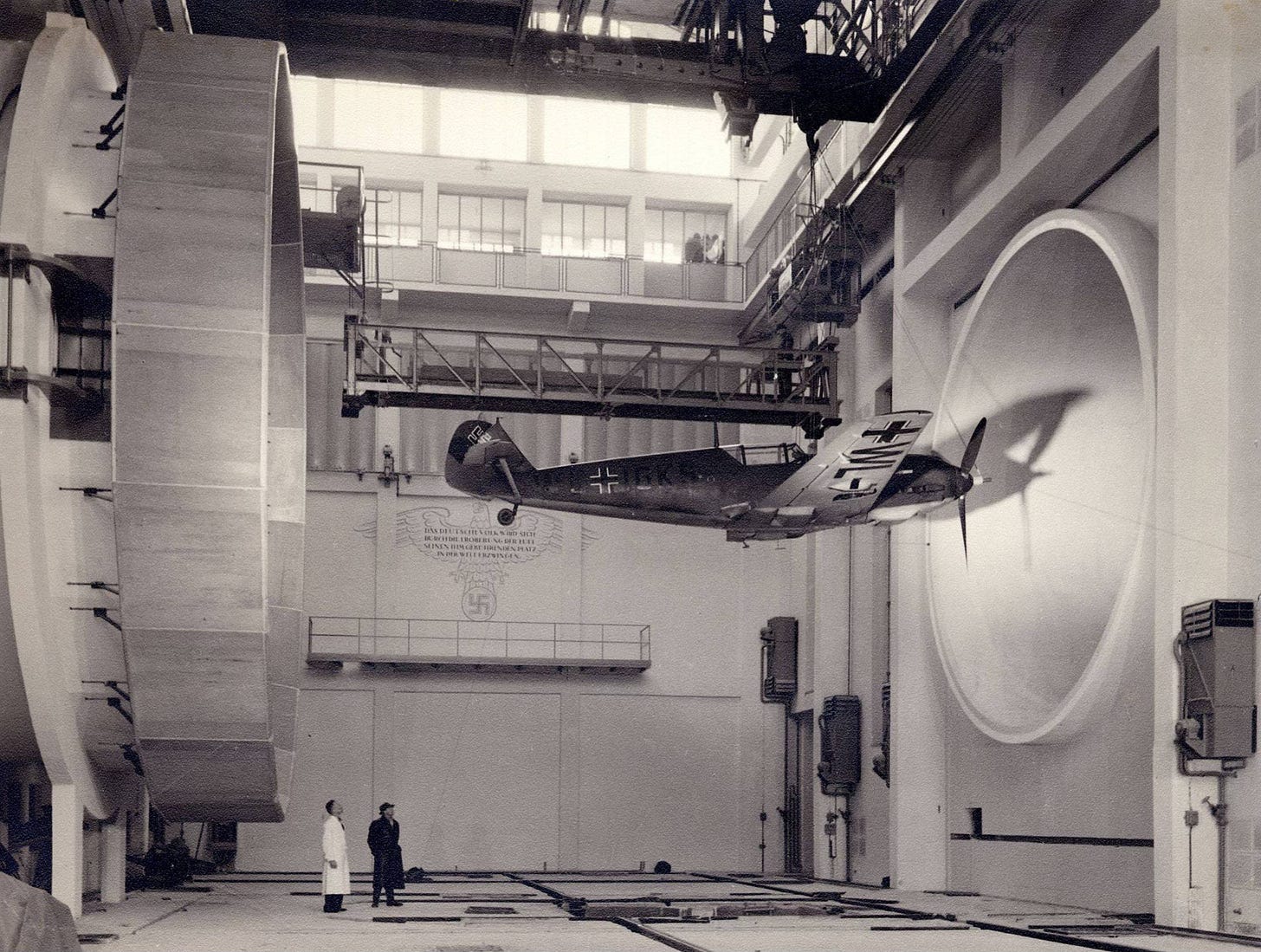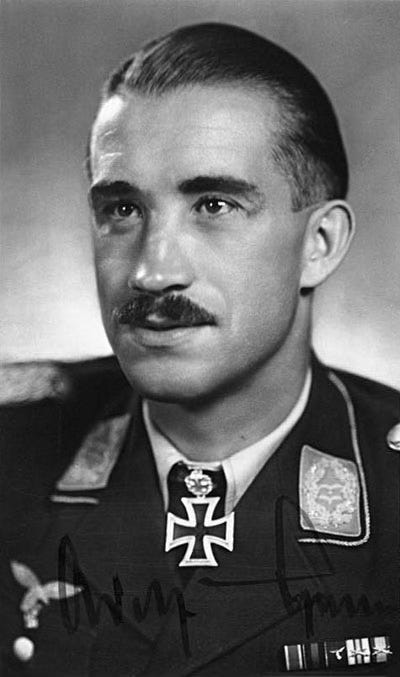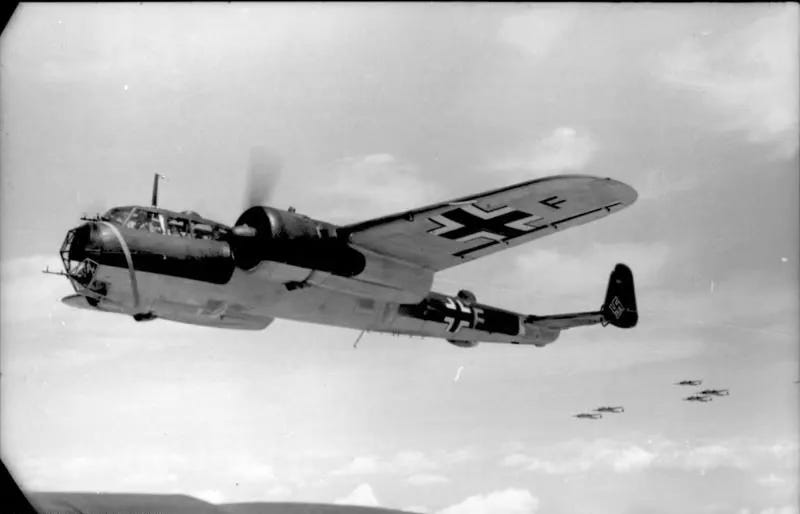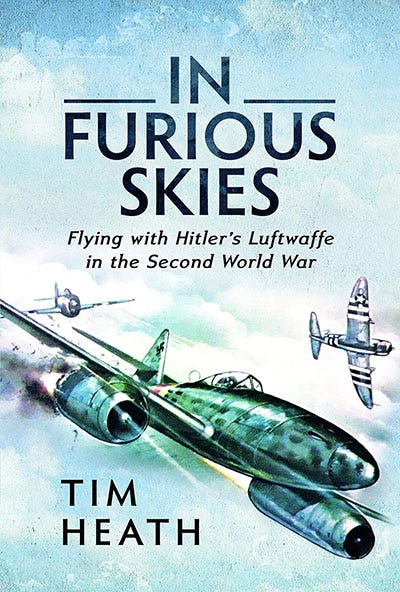'In Furious Skies'
How German pilots viewed the Battle of Britain - an excerpt from 'In Furious Skies: Flying with Hitler's Luftwaffe in the Second World War'

Tim Heath has made his name with a series of books that present the German perspective on the war. I have previously featured Sex under the Swastika. These post-war recollections give an honest ‘warts and all’ insight into how Germans viewed the war, perspectives that would have been difficult, if not dangerous, to express openly under the Nazi regime.
In Furious Skies: Flying with Hitler's Luftwaffe in the Second World War is a wide-ranging collection of stories from Luftwaffe airmen telling the story of the Luftwaffe from its earliest stages, when the Hitler Youth trained in gliders, right through to the final desperate weeks of 1945 when the still experimental jets and rocket aircraft attempted to defend the Reich against the overwhelming forces of the Allies. Through these personal stories the evolving story of the Luftwaffe emerges - the much vaunted organisation that was once the face of modern warfare that eventually collapsed under the weight of Nazi fantasies.
The following excerpt takes up the story at the beginning of the Battle of Britain, with a Stuka pilot, Karl Voght reflecting on their role:
I feel our Stukas were adequate for attacking shipping in the Channel, but not for the bigger land targets such as bases and other infrastructure. When used against targets that required that edge of precision, one or two bombs or clusters of lighter bombs to get the job done was fair enough. The fact we lost Lichtenfels played heavily on my mind too; he was an experienced Stuka pilot. If he fell at this very early phase of the fighting, what hope was there for us less accomplished airmen to survive. I guess something twigged in my mind after that.
I began writing letters home far more frequently than what I had done in Poland and France. I made arrangements in case I did not come back home too. I even penned a letter to my parents which should only be opened in the event I failed to return from an operation. It was one of the hardest letters I have ever had to write. Can you imagine having to write to your mother and father from a dead man’s perspective? What should I write, what words could possibly be said to comfort them?
The Battle of Britain officially began on 10 July 1940, so the loss of the aircraft as reported in the raid carried out by Karl Vbght and his comrades of 9 July was not officially recognized as being the first Luftwaffe aircraft shot down in the battle. The first Luftwaffe aircraft to be claimed by the RAF as pointed out by aviation historian Bob Collis was a Dornier 17 Z of II/KG 3 which was a shared victory between three Spitfire pilots of the Coltishall-based 66 Squadron. The Dornier crashed into the North Sea twenty miles off the coast of Norfolk; the crew were observed swimming clear of their aircraft, one surrounded by a very conspicuous green marker dye used to alert the German air sea rescue service, the Seenotdienst, to their plight. One of the RAF pilots radioed in the position of the three visible Dornier crew in the water. Despite efforts to save the German airmen, all four perished and were never seen again. This was a fate that would befall many more Luftwaffe bomber and fighter airmen by the end of the Luftwaffe’s aerial campaign against Britain.
Karl Voght recalled the fear of being shot down over the North Sea or English Channel:
The prospect of having to bale out either over the North Sea or the Channel was too dreadful to comprehend. It mattered not what time of the year it was, the waters of the English Channel and North Sea were always freezing cold. We were not stupid; we understood that the chances of rescue once down in the water were slim. If you were lucky the British would come and get you and pull you out. Our own air sea rescue service was wary about flying into hostile airspace as they too faced the possibility of ending up in the drink alongside those they were trying to rescue.
… more often than not, any pilot ending up in the sea was finished
So, more often than not, any pilot ending up in the sea was finished and many were never seen again after parachuting into the English Channel or the cold waters of the North Sea. I always had a small pistol with me which I carried in the right pocket of my flying suit. I always said to myself, Voght, if you end up in the drink with no hope of rescue, you can always shoot yourself rather than suffer death by hyperthermia or drowning. Yes, that was a real thought and a real danger during the Battle of Britain especially.
Many other pilots experienced what became known as Channel Fever. The moment the order to take off was given, you would start to tremble and sweat, not a hot sweat but more a cold, chilling one; your throat would go dry, and your head began to pound. If you got back home, you were thoroughly mentally exhausted through the stress and fear, and the thought of having to do the same again the next day and the day after that and so on broke some of the crewmen. They just couldn’t deal with it anymore and had to be withdrawn from flying and sent to sanatoriums back home. Unteroffizier Ludwig Werner was the pilot of a Dornier Do 17 Z with 1/ KG 3 based at Le Culot, Belgium, and recalled his arrival there:
It was all very nice touching down on this grass airfield surrounded by trees and the pleasant countryside. Our accommodation was far from that of a first-class hotel in the beginning, but it was adequate, and both the days and nights were getting warmer, so it wasn’t a problem really. Some of us were billeted in tents, others had brick buildings which were hastily turned into mess rooms and sleeping quarters. It didn’t take long for us to settle in and while we awaited further orders, we could go off into the nearby town to see the sights and admire some of the pretty Belgian girls there.
Some of them were stunners but we had been warned against taking local girls out
Some of them were stunners but we had been warned against taking local girls out by our commanding officer. There was the risk that they could be spies and that harm could come to us as individuals or the whole unit. So, I’m afraid most of us had to stick to the rules, but there were brothels available to us, places where we could go and do the deed and walk away afterwards.
We began operations a day after the French surrender. Our first loss came on the night of 23 June. One of our aircraft, a Dornier 17, did not return to the aerodrome and all four crew were never seen again. Reports were sporadic when they trickled down to us; they didn’t want to tell us much about losses as obviously it was not good for morale. A comrade told me later that Oberleutnant Scharpkowski and his crew had gone down into the sea.
On 9 July, it was our turn as we took off for a night raid on central England [West Midlands], For the most part the operation went to plan; it was just like the training, only we were now carrying live bombs. The flight was mostly textbook as you say, boring if anything. When we arrived over the target area there was no intense ground fire. We dropped our bombs and got out of there and returned home unscathed. The daylight operations were the worst, although our fighters ranged ahead of us and tackled any enemy fighters sent up to intercept us. The Messerschmitts did not carry sufficient fuel to be able to escort us back home, which was a huge problem. The Messerschmitt Bf 110 had the fuel capacity but was no match for the Spitfire and Hurricane fighters; it was quite ridiculous.
Our bomber groups pushed on in a battle that steadily grew in its intensity. We were attacked by Hurricanes on one occasion; it was like someone had struck a wasp’s nest and all the wasps were chasing us. The enemy was a determined foe, and it was as much as our poor gunners could do to keep them off us. The Dornier 17 Z, which the British nicknamed ‘The Flying Pencil’ due to its shape, was a light bomber and its controls were highly responsive so luckily for us we jinked and weaved and got through the constant fighter attack by the skin of our teeth. Our bombs hit part of a radio station and once the bombs were gone, we turned and I set the controls at full throttle to get away. We had been hit by machine-gun bullets and to hear them strike your aircraft for that first time is terrifying; you realize someone is shooting at you, trying to kill you. When we landed back at Le Culot, we all breathed a sigh of relief. Yes, we were frightened by the experience and when I got out of the aircraft and saw the state of the rear fuselage, I thought to myself, How the hell did we get away with that? There were bullets holes in the metal, all over the place. We were very lucky they were small-calibre machine-gun bullets and not cannon shells; had they been explosive cannon shells like what our Messerschmitt fighters were armed with, they would have blown off the rear fuselage of the aircraft and we may have been forced to take to our parachutes or worse still, killed.
I began to lose heart at that point in how our planners were conducting things. It didn’t seem organized at all.
The next problem was our machine that when inspected had some structural damage. It was not major damage, just pieces which had been severed by bullets. The aircraft could not be repaired properly at the airfield, so it had to be sent back to Germany; this was ridiculous. There was not one person who could carry out repairs in the field at that time. As we were expected to continue operations, sometimes a crew would land after flying a mission, their Dornier would then be refuelled and rearmed and we would get on board and fly it on the next mission while they had a rest. Just because our aircraft was sent off to be fixed did not mean we got out of flying missions. It was crazy and I began to lose heart at that point in how our planners were conducting things. It didn’t seem organized at all.
From the 10 July 1940, the air war against England steadily intensified with the Luftwaffe mounting ever-larger bombing raids, especially against the RAF airfields in the south of England. The fighter pilots of the Luftwaffe would trail the bombers at medium and high altitudes on what were known as Freie Jagd (free hunt) missions. These missions were deliberately intended to draw out the RAF Spitfire and Hurricane fighters. Of course, the RAF obliged, only to find themselves at a serious tactical disadvantage against the Bf 109s.

As the RAF fighters climbed to intercept, the Bf 109s would dive upon them and this is where many of the RAF fighter losses occurred. Luftwaffe fighter pilot Adolf Galland recalled of the RAF’s predicament at the time:
Our bomber force would take off first, as we were so much faster than them. We would give them an allotted time in which to take off and head out across the English Channel, then we would take off and position ourselves above and behind the bombers. As the bombers approached the south coast, the RAF would be alerted, but their ground control system did not allow for the time that they needed to climb to a useful altitude with which to engage us.
Yes, this gave us the advantage that the fighter pilot always seeks, having altitude and the opportunity of not only seeing the enemy but in a position to initiate the attack on him. We knew the Spitfires and Hurricane would come and we would see them straining to get height up to our bombers. Our task was then to fall on them using our high speed. You would select a victim in your gunsight and if you made just one good pass you could destroy him using fire from the two machine guns and the two 2cm cannons. After the first attack we would climb as fast as possible and make another attack on the enemy fighters.
Yes, I encountered the Spitfire on many occasions and it was a very good aeroplane. You avoided getting into a turning fight with them where you could end up in their gunsights; instead, you dived for the ground to shake them off, then climbed back to altitude where you as a pilot could assess your position and make the decision to either single out an enemy to attack or return home.
it was all too easy to get carried away in the fight where there were aircraft all over the place
Often low fuel was a serious problem for us, as it was all too easy to get carried away in the fight where there were aircraft all over the place flying in this deadly ballet, with shot and shell flying everywhere. There would sometimes be hundreds of aircraft all over the sky for as far as the eye could see, but you would have to turn back and head home or you might end up having to crash-land in the sea on the way home, which was never a good prospect.
That was the only problem with our Messerschmitt Bf 109 - we had the firepower and the advantage of speed in the climb and the dive - it was the low fuel capacity that was a serious hindrance when the enemy was around and you could not engage him for any useful length of time. In all we had ten minutes of combat time, fifteen at the very most, and that was pushing things. The further inland we penetrated the less combat time we had; yes, it was a problem for us fighter pilots.
© Tim Heath 2022, 'In Furious Skies: Flying with Hitler's Luftwaffe in the Second World War '. Reproduced courtesy of Pen & Sword Publishers Ltd.



